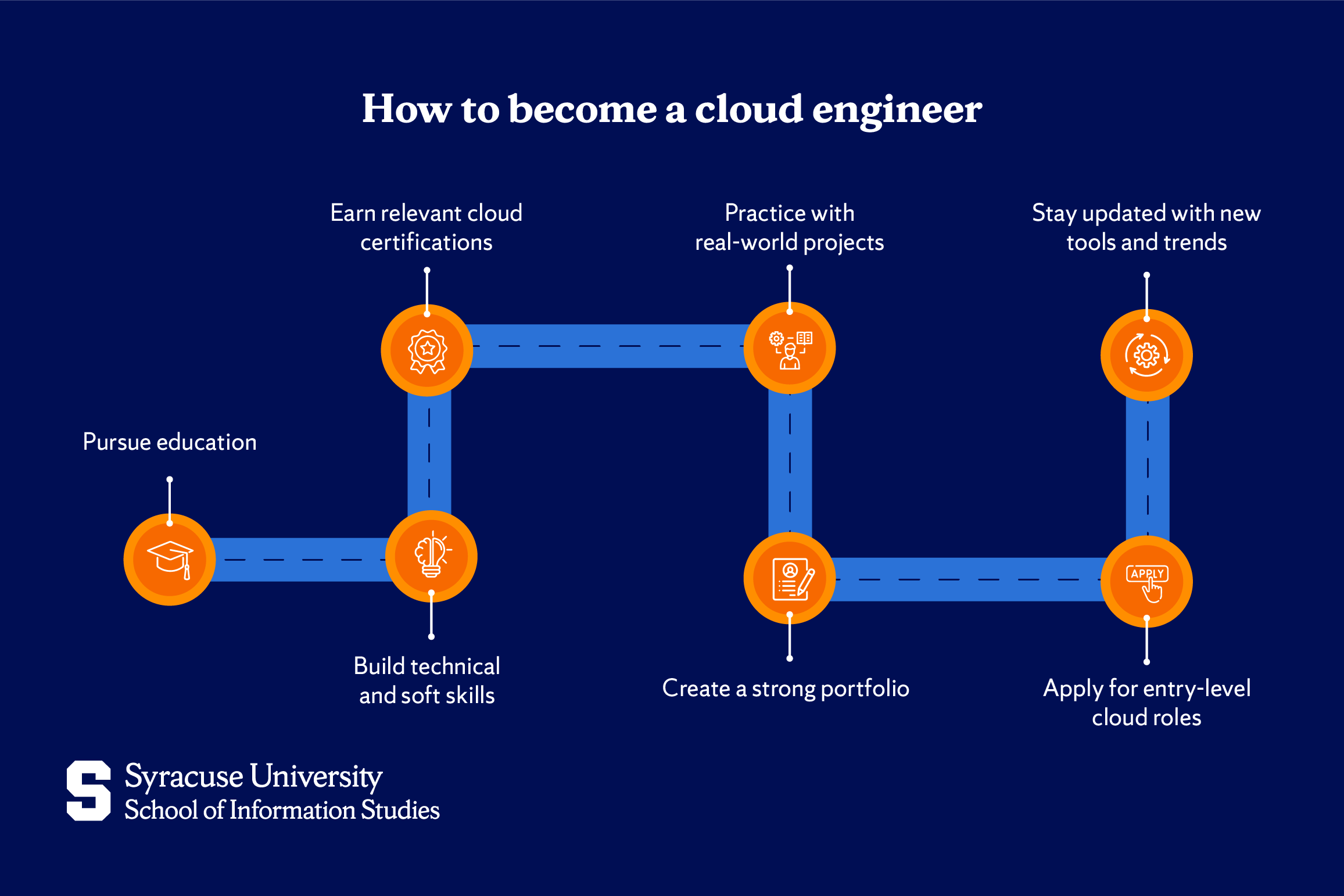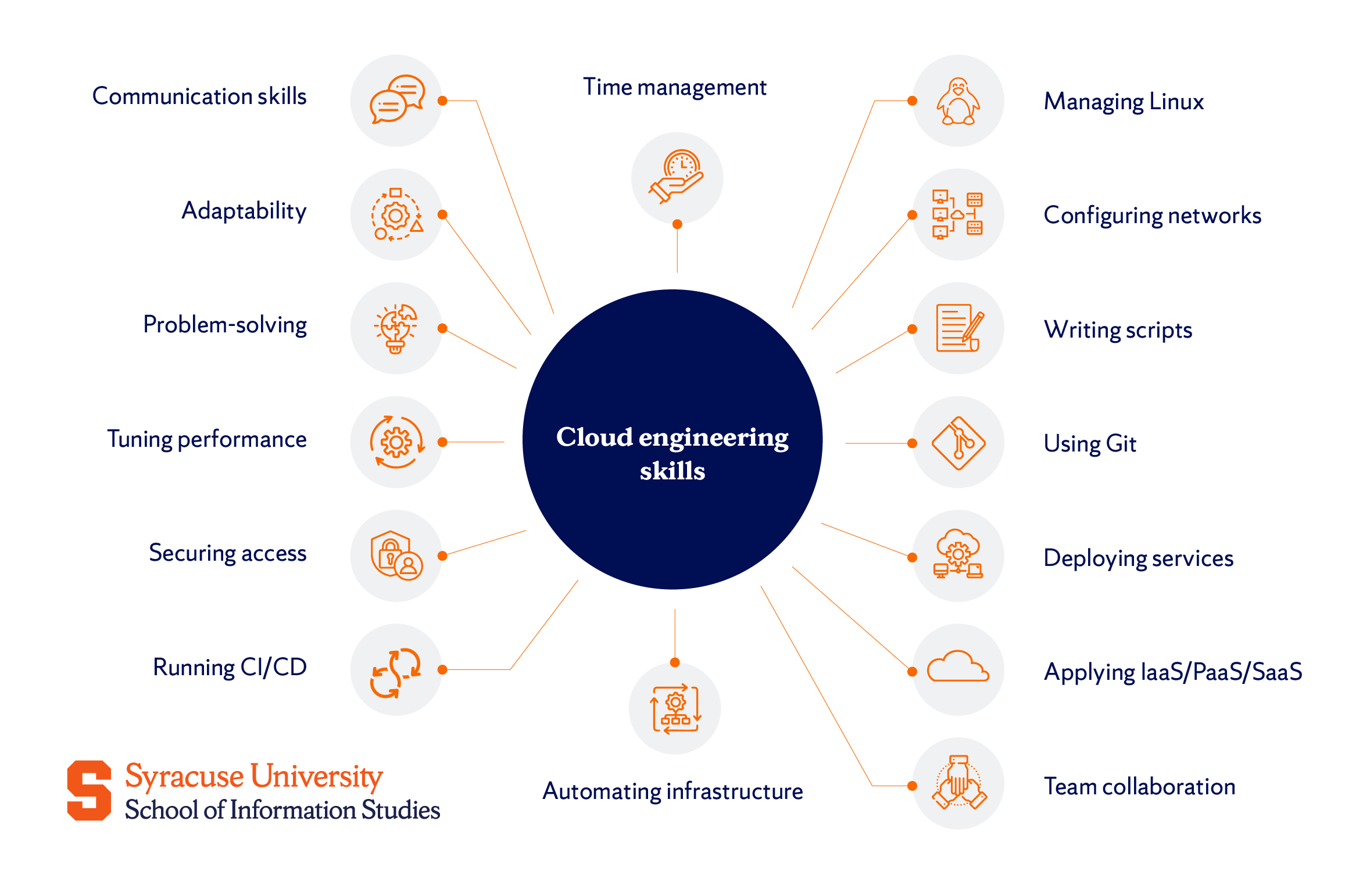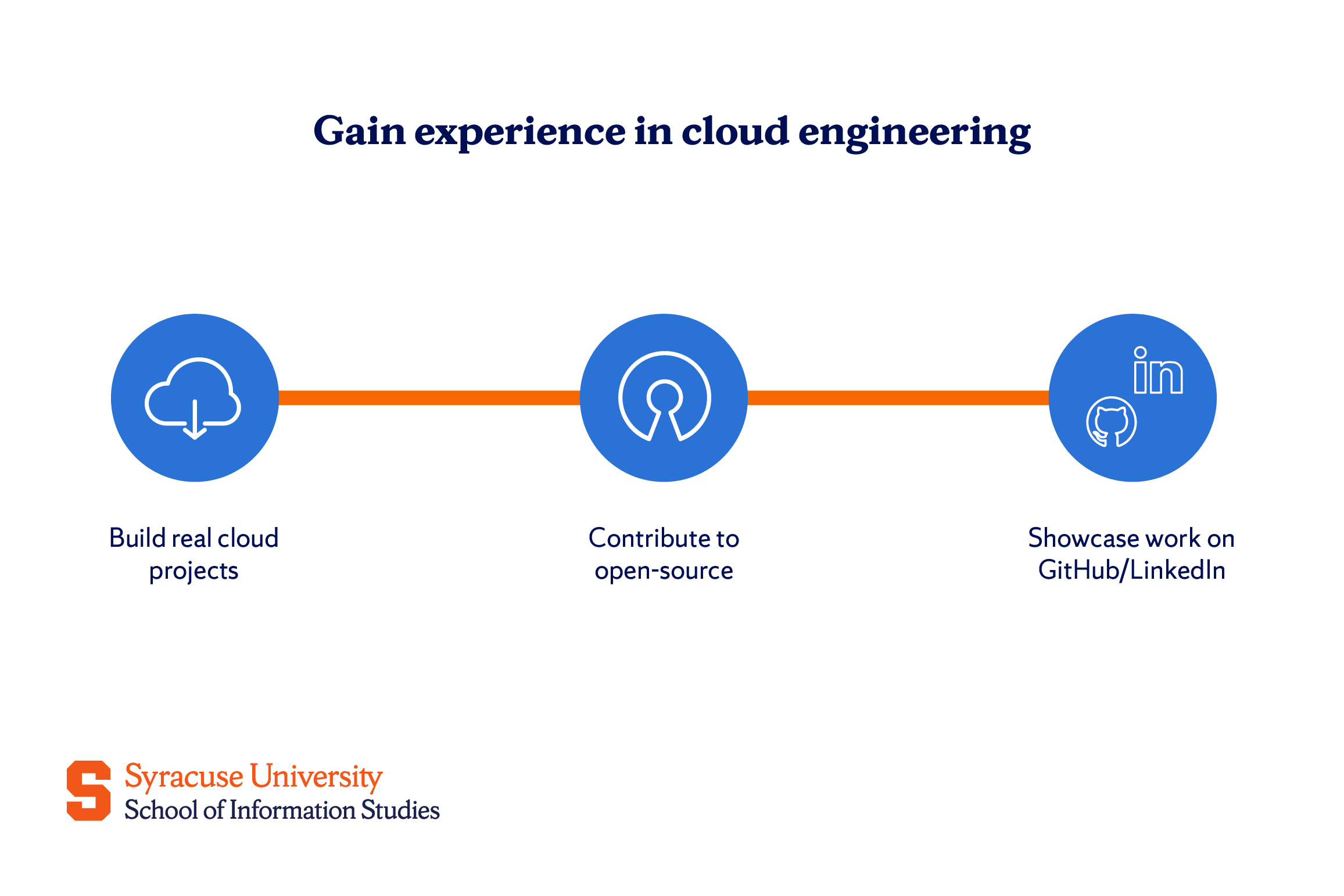Key Takeaways
- Cloud engineers design, build, and manage cloud systems that power apps, store data, and support business operations.
- You can become a cloud engineer through a bachelor’s or master’s degree or by taking alternative paths like certificate programs.
- Success in cloud engineering requires both technical skills—like cloud platforms, scripting, and automation—and soft skills such as problem-solving and teamwork.
When you open an app like Instagram or X on your phone and then log in from a new device, your messages, photos, settings, and everything else are the same. That’s because your data isn’t tied to a single phone but stored in what’s called the cloud.
The cloud is a system of internet-connected servers that cloud engineers build and maintain. These engineers play a crucial role in modern technology and have a rewarding career path that is worth looking into. If you’re curious about how to become a cloud engineer, it all starts with the right education and a strong foundation of skills.
Understand What a Cloud Engineer Does
Cloud engineers have a significant influence on modern IT infrastructure. Their work revolves around applying core engineering principles to cloud-based systems. Some of their primary duties include:
- Designing and building cloud-based infrastructure
- Planning and structuring cloud architecture
- Monitoring performance and system reliability
- Managing resources and cloud-based services
- Securing data and maintaining user privacy
- Troubleshooting technical issues
- Automating deployment and integration workflows
- Collaborating with development and IT operations teams
- Maintaining compliance with security and industry standards

Cloud engineering—and even the term cloud engineer itself—is often used as an umbrella for a range of specialized roles that support and manage cloud-based systems. These roles focus on different aspects of cloud technology and typically include:
- Cloud software engineer: Builds, tests, and maintains applications designed to run on cloud platforms.
- Cloud security engineer: Protects cloud systems by identifying vulnerabilities and implementing security protocols.
- Cloud support engineer: Troubleshoots issues and provides technical support for cloud-based services.
- DevOps engineer: Automates and streamlines the development-to-deployment process in cloud environments.
- Cloud architect: Designs the overall structure and strategy of cloud infrastructure.
Cloud Engineer Education Requirements and Background
Proper training is essential for anyone pursuing a role in cloud engineering, especially since the field demands technical expertise and an understanding of how cloud systems operate at scale.
Fortunately, there are multiple pathways into this career, allowing for flexibility based on your background, time, and goals. The traditional one often begins with a bachelor’s degree in Computer Science, Information Management and Technology, or another closely related discipline.
While a bachelor’s degree can qualify you for many roles, you can deepen your expertise and even prepare for leadership positions if you add a master’s degree in Information Systems or another relevant degree.
Although formal degrees are arguably the safest and most common path to pursuing a career in cloud engineering, they aren’t the only option you have. Non-traditional options like coding bootcamps, online certification programs, and even associate degrees can serve as viable entry points. They are most common for career changers and those seeking to build skills quickly.

Cloud Engineer Requirements: Skills You Need
To succeed as a cloud engineer, you’ll need a well-rounded blend of technical and soft skills. These skills will allow you to design, manage, and optimize cloud systems, as well as work with teams and overcome potential challenges.
Technical skills
A strong technical foundation is non-negotiable. Many employers expect cloud engineers to bring hands-on experience with operating systems, coding, version control, and cloud environments. To be more specific, for this role, you need to develop your skills in:
- Managing Linux-based environments like Ubuntu or RHEL
- Configuring and troubleshooting network protocols
- Writing automation scripts in Python or Bash
- Using version control effectively with Git
- Deploying and scaling services on AWS, Azure, or GCP
- Applying knowledge of IaaS, PaaS, and SaaS models
- Automating infrastructure with tools like Terraform or AWS CloudFormation
- Implementing CI/CD workflows for continuous deployment
- Securing cloud systems through identity and access management
- Optimizing cloud storage and database performance

Soft skills
In addition to the technical side, cloud engineers must also be effective collaborators and clear communicators. Therefore, the required soft skills for this role encompass:
- Problem-solving
- Adaptability
- Communication skills
- Team collaboration
- Time management
Certifications That Help You Stand Out
Certifications are powerful tools for demonstrating that you have developed relevant, up-to-date cloud skills. Earning these credentials builds your credibility and can boost your employability.
There are many respected cloud certifications worth considering. For example, Syracuse University’s iSchool offers a Certificate of Advanced Study in Cloud Management that equips learners with high-demand skills in a condensed timeframe. The program covers everything from cloud migration planning to overseeing cloud infrastructure across industries. Students can focus on specialized tracks like cloud solutions management, data management, or networking and security.
This certificate program is open to both beginners and experienced professionals and can be earned as a standalone credential or added to a master’s degree for greater career flexibility.
Some other industry-recognized options worth looking into include:
- AWS Certified Solutions Architect – Associate
- AWS Certified DevOps Engineer – Professional
- CCSP – Certified Cloud Security Professional
- IBM Certified Solution Architect – Cloud Pak for Data
- Microsoft Certified: DevOps Engineer Expert
- Microsoft Certified: Azure Solutions Architect Expert
- Professional Data Engineer Certification
- Professional Cloud Architect Certification
Gain Hands-On Experience
While certifications can validate your knowledge, they aren’t a substitute for real-world experience. Employers tend to look for professionals who have proven that they can apply their skills effectively.
You can begin with small practical projects like deploying a static website, setting up CI/CD pipelines, or managing infrastructure with Terraform. These types of tasks mirror what cloud engineers do daily and, therefore, can help solidify your technical skills.
You should also take advantage of interactive platforms such as the AWS Free Tier, Google Cloud Skills Boost, or Azure Sandbox, which allow you to work in live environments without the need for major upfront costs. This way, you’ll further build and test your cloud knowledge. Additionally, contributing to open-source projects or showcasing your own work on GitHub is a great way to demonstrate initiative and skill.

Build a Cloud Engineer Portfolio
A portfolio gives you the opportunity to display the skills and achievements you’d typically mention on a resume or in an interview. Instead of just describing your capabilities, it provides real examples of your work, offering employers clear proof of what you can do.
To create a portfolio of your own, start by creating a well-organized GitHub repository with your projects and make sure that each project is clearly documented, including a README file that explains the project and your work in it. You could also write short “project case studies” for each one—just a few paragraphs outlining the problem you tackled, the solution you built, and the impact or result.
In addition to GitHub, consider sharing your work through a personal blog or LinkedIn posts. Write-ups can give potential employers a better sense of your thought process, how you approach challenges, and what you’ve learned along the way.
Navigate the Job Market
Roles like cloud support engineer, cloud intern, or junior DevOps engineer can serve as valuable entry points, helping you gain experience while working toward more advanced positions. When applying, make sure your resume speaks the employer’s language—use keywords from the job description and highlight project outcomes with clear, measurable results. A good portfolio gets you noticed; a tailored resume gets you in the door.
However, pursuing a cloud engineering career is not as simple as applying to job listings on a job board. Throughout this process, it’s important to build connections and immerse yourself in the cloud tech community. Join LinkedIn groups dedicated to AWS, Azure, or Google Cloud; participate in Reddit discussions; and connect with others in Discord or Slack channels focused on cloud technologies.
Keep Learning: Stay Up to Date With Cloud Tech
Continuous learning is important, regardless of your skill level and field of work. The cloud tech industry moves fast as new tools emerge and practices evolve. Yesterday’s skills might not be enough tomorrow.
A great way to keep your cloud computing skills sharp is by combining multiple learning methods, such as:
- Read cloud blogs and articles from trusted sources that cover AWS, Azure, GCP, DevOps trends, and infrastructure updates
- Attend webinars and conferences where you can learn from industry leaders.
- Take advanced or refresher courses
- Engage in online communities
Building Your Future in Cloud Engineering
Becoming a cloud engineer is a smart career move, as the cloud is needed for everything, from social media and streaming platforms to enterprise applications and data infrastructure. However, to get into this role and, more importantly, succeed in it, proper training is needed. While there are many paths to cloud engineering, formal education provides the most solid foundation.
At Syracuse University’s iSchool, you’ll find a range of programs—bachelor’s, master’s, and certificate—that equip learners with in-demand skills and knowledge. So, if you’re ready to build your future on the cloud, make sure you’re doing it with the right support—and the right education.
Frequently Asked Questions (FAQs)
Can you become a cloud engineer without a degree?
Technically, yes. Some cloud engineers enter the field through bootcamps, certifications, and hands-on experience.
How long does it take to become a cloud engineer?
It typically takes 6 months to 4 years, depending on the type of training you pursue. Typically, it’s shorter for bootcamps and certificates, whereas it’s longer for traditional degrees.
Is a cloud engineer a high-paying job?
Yes, cloud engineering is considered a high-paying field. Generally, computer and information technology occupations earn a median annual wage of $105,990.
Is it difficult to become a cloud engineer?
It can definitely be challenging due to the technical skills required. However, as long as you have proper training and consistent practice, it’s very achievable.
